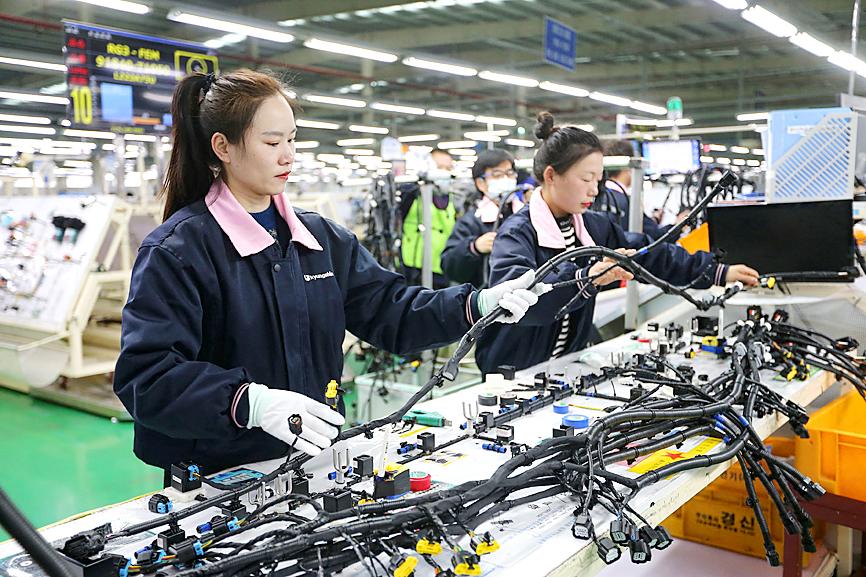BizLink Holding Inc (貿聯) has proposed a cash dividend of NT$8.25 per share, after the wire harness maker reported earnings per share of NT$14.01 for last year, it said last week.
The board of directors’ proposed dividend was lower than last year’s distribution, when the company paid NT$9 per share on earnings per share of NT$15.54 in 2019.
The proposal represents a payout ratio of 58.89 percent. Based on the company’s closing share price of NT$268 on Friday, it also suggests a dividend yield of 3.08 percent.

Photo: STR/AFP/China OUT
BizLink — the sole supplier of wiring harnesses for battery management systems in Tesla Inc’s Model 3 sedans — reported that net profit last year decreased 0.85 percent year-on-year to NT$1.83 billion (US$64 million) on revenue of NT$22.54 billion, down 2.4 percent from 2019.
Gross margin was 25.33 percent, due to better cost controls and an improved product mix, while operating margin was 10.87 percent, BizLink said.
The firm’s profit margins have been under pressure in the near term due to unfavorable foreign-exchange rates and rising raw material prices, Yuanta Securities Investment Consulting Co (元大投顧) said in a note on Friday.
“However, for the mid to long term, we believe BizLink’s ongoing product mix improvement will drive its operating profit growth of 25 percent year-on-year in 2021 and 21 percent growth for 2022,” Yuanta said.
BizLink’s products also include cables for electric-vehicle battery management systems, as well as components for information technology, consumer electronics, electrical appliances and telecom equipment.
The effects of the COVID-19 pandemic persisted in the fourth quarter last year, driving demand for cloud-based services and boosting its shipments in the information technology, consumer electronics, electrical appliances and vehicle segments.
Year-end holiday demand also caused port congestion, container shortages and other logistics hurdles, which delayed some equipment for electrical appliances, and the automotive and semiconductor industries from December last year into January, it said.
Overall, materials costs and component shortages were key headwinds in the fourth quarter, it said.
BizLink remains positive about this year’s outlook as companies seek to diversify their production and vaccine rollouts are under way, it said.
However, global supply chains would remain strained as the effects of the pandemic persist, with higher costs as a result of elevated demand, rolling partial lockdowns, various materials and component shortages, as well as extreme weather in some areas, it said.
“Our long-term outlook remains favorable, and we anticipate sustained growth within data centers, energy, electric vehicles and semiconductor capital equipment,” BizLink said.
“A rising contribution from these secular drivers will represent a steady overall flow of long-term sales and profit growth over the next few years,” the company said. “Further developments within these secular drivers are ongoing with momentum to build up step by step, and add to our long-term aspirations.”

MULTIFACETED: A task force has analyzed possible scenarios and created responses to assist domestic industries in dealing with US tariffs, the economics minister said The Executive Yuan is tomorrow to announce countermeasures to US President Donald Trump’s planned reciprocal tariffs, although the details of the plan would not be made public until Monday next week, Minister of Economic Affairs J.W. Kuo (郭智輝) said yesterday. The Cabinet established an economic and trade task force in November last year to deal with US trade and tariff related issues, Kuo told reporters outside the legislature in Taipei. The task force has been analyzing and evaluating all kinds of scenarios to identify suitable responses and determine how best to assist domestic industries in managing the effects of Trump’s tariffs, he

TIGHT-LIPPED: UMC said it had no merger plans at the moment, after Nikkei Asia reported that the firm and GlobalFoundries were considering restarting merger talks United Microelectronics Corp (UMC, 聯電), the world’s No. 4 contract chipmaker, yesterday launched a new US$5 billion 12-inch chip factory in Singapore as part of its latest effort to diversify its manufacturing footprint amid growing geopolitical risks. The new factory, adjacent to UMC’s existing Singapore fab in the Pasir Res Wafer Fab Park, is scheduled to enter volume production next year, utilizing mature 22-nanometer and 28-nanometer process technologies, UMC said in a statement. The company plans to invest US$5 billion during the first phase of the new fab, which would have an installed capacity of 30,000 12-inch wafers per month, it said. The

Taiwan’s official purchasing managers’ index (PMI) last month rose 0.2 percentage points to 54.2, in a second consecutive month of expansion, thanks to front-loading demand intended to avoid potential US tariff hikes, the Chung-Hua Institution for Economic Research (CIER, 中華經濟研究院) said yesterday. While short-term demand appeared robust, uncertainties rose due to US President Donald Trump’s unpredictable trade policy, CIER president Lien Hsien-ming (連賢明) told a news conference in Taipei. Taiwan’s economy this year would be characterized by high-level fluctuations and the volatility would be wilder than most expect, Lien said Demand for electronics, particularly semiconductors, continues to benefit from US technology giants’ effort

‘SWASTICAR’: Tesla CEO Elon Musk’s close association with Donald Trump has prompted opponents to brand him a ‘Nazi’ and resulted in a dramatic drop in sales Demonstrators descended on Tesla Inc dealerships across the US, and in Europe and Canada on Saturday to protest company chief Elon Musk, who has amassed extraordinary power as a top adviser to US President Donald Trump. Waving signs with messages such as “Musk is stealing our money” and “Reclaim our country,” the protests largely took place peacefully following fiery episodes of vandalism on Tesla vehicles, dealerships and other facilities in recent weeks that US officials have denounced as terrorism. Hundreds rallied on Saturday outside the Tesla dealership in Manhattan. Some blasted Musk, the world’s richest man, while others demanded the shuttering of his